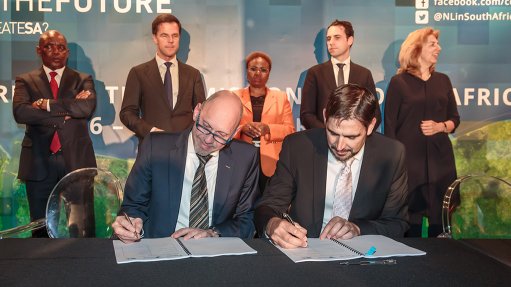
TECHNOLOGY TRANSFER AGREEMENT René Noppeney and Karl Juncker signing the agreement, which will see Nereda technology being used by local wastewater specialists WEC Projects
International engineering and project management consultancy Royal Haskoning-DHV (RHDHV) and South African waste-water specialist WEC Projects signed an agreement in Johannesburg last month for the use of RHDHV’s Nereda wastewater treatment technology in South Africa.
The innovative technology has proven to be more efficient and sustainable, as well as kinder to the environment, with lower operating and capital costs than conventional methods of wastewater treatment.
The technology is entirely based on natural processes, does not require any chemicals and features aerobic granular biomass with faster settling times than conventional activated sludge.
The agreement was signed in the presence of Netherlands Prime Minister Mark Rutte and a number of South African government dignitaries, including Department of Public Enterprises Minister Lynne Brown and Department of Water and Sanitation Minister Nomvula Mokonyane.
RHDHV global water products and innovation director René Noppeney states that the agreement with WEC is a leap forward for the local wastewater treatment market. “I am confident that, after the first three Nereda installations in South Africa, many others will follow. We are delighted that WEC has decided to become our partner.”
RHDHV South Africa water advisory director Bert Bakker adds that the company needed a local partner with a strong and innovative background in the South African wastewater treatment market and a contractor in the mechanical field, with capacity to tap into the knowledge and intellectual property of RHDHV.
“We wanted to transfer our knowledge to a partner that truly understands the needs of our South African clients, and WEC Projects checks all the boxes,” he notes.
RHDHV and WEC are implementing Nereda technology at the Hartebeestfontein Wastewater Treatment Works, which aims to improve the capacity of the plant by 5 Mℓ/d using existing infrastructure. The Hartebeestfontein plant is currently under construction for East Rand Water Care Company (ERWAT), in Gauteng.
ERWAT appointed WEC as the design and construction company for the project. RHDHV is providing WEC with the design and technology package to effectively deploy Nereda at the Hartebeestfontein plant, which is scheduled to start commissioning in May next year.
This will be the third Nereda plant in South Africa and the first in Gauteng. The first two Nereda plants are located at Wemmershoek and Gansbaai, in the Western Cape, both of which have 5 Mℓ/d capacities. The Wemmershoek project was commissioned at the beginning of this year and the Gansbaai plant began operations in 2009.
RHDHV South Africa MD Salani Sithole states that, since its commissioning, the innovative wastewater treatment works at Wemmershoek has been performing “above expectation”, providing final effluent quality that are higher than the general limit standards set by the Department of Water and Sanitation.
The global adoption of Nereda technology is testament to its ability to treat wastewater in a cost-effective and sustainable manner while limiting the plant’s footprint, making the technology “a perfect fit for the South African wastewater treatment market”, WEC MD Karl Juncker highlights.
He suggests that Nereda could become the South African standard in wastewater treatment, which augurs well for WEC, which is the local licensee for the technology.
WEC aims to grow its business by offering effective solutions through innovative technologies, Juncker notes, adding that “. . . to deliver solutions to our country’s sewage-treatment challenges, we need innovation, and Nereda is that innovation”.
He adds that signing this agreement is not only a “huge milestone in the life of WEC Projects but also a significant development for South Africa’s wastewater treatment sector”.
The footprint of plants using Nereda technology is up to four times smaller than that of conventional installations and the process consumes only up to half the energy.